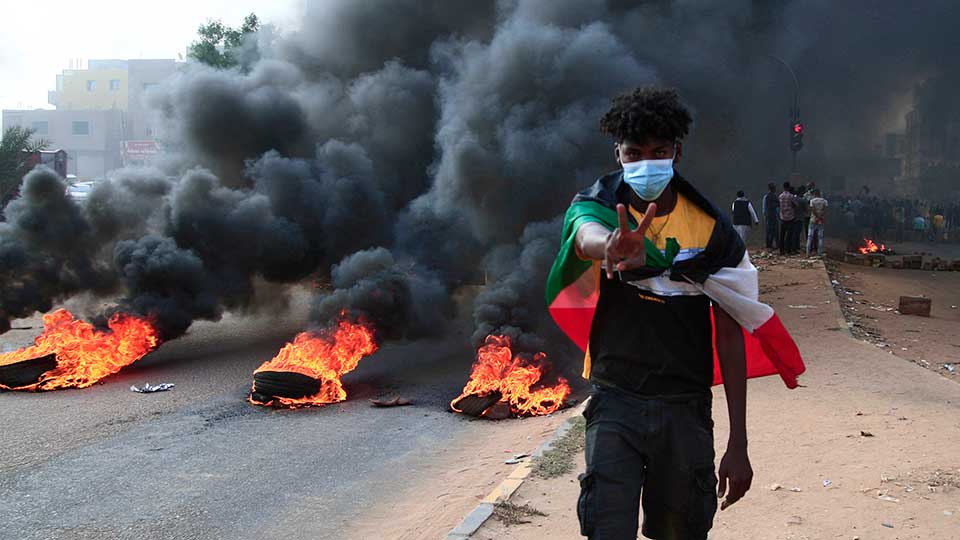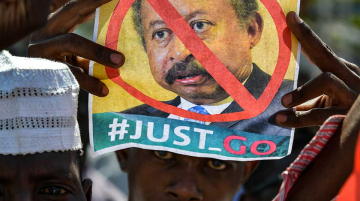
By Lukas Fiala and Hugo Jones, China Foresight LSE IDEAS
Scenes of chaos reached us from Sudan this week, as a fragile power-sharing agreement collapsed. On 25th October, merely weeks after a failed coup attempt, Sudanese generals toppled the civilian-led government that had been overseeing Sudan’s transition after Omar al-Bashir was removed from office in April 2019. General Abdel Fattah al-Burhan dissolved the Sovereign Council that had governed Sudan during this transition period and whose leadership he was meant to transfer to a civilian representative in July 2022, declaring a state of emergency in the process. Crowds of protestors have been met with live ammunition, killing at least seven, as the human rights situation deteriorates.
Similar to Guinea in September and Afghanistan in August, the situation in Sudan gives further insight into the evolving nature of China’s non-interference policy in the Global South. Non-interference has been a guiding foreign policy principle since the foundation of the PRC, simultaneously informing and featuring in the 1954 ‘five principles of peaceful coexistence.’ But non-interference faces increasing pressure due to the politics inevitably bound up with the broad financial and economic role China plays across many countries in the 21st century.
China Foresight’s recent blog takes the Greater Ethiopian Renaissance Dam (GERD) dispute as an example of a complex transboundary issue where Beijing’s well-worn assurances of non-interference are failing to maintain and protect its long-term interests. And reports this week that China may construct a military base in Tajikistan, near the border with Afghanistan, further show the limits of non-interference. The security vacuum left by the US withdrawal has left China vulnerable, despite Beijing’s warm public reception of the Taliban. Such issues increasingly demand an active, not a passive, response from China.
The obvious balancing act for Beijing is thus to protect national interests overseas while maintaining the framing of China as a “different” external actor as compared to the West in Africa and elsewhere in the Global South. Chinese academics and strategists, for instance, have begun to differentiate between “intervention” (干预) and ”interference“(干涉)in order to find legitimate framing devices to describe China’s more active political involvement abroad.
Sudan has probed – and challenged – such ideas. As one of China’s foremost economic partners during the early days of the “Go Out” period in the 1990s and early 2000s, the country has shaped not only the operational practices of Chinese state-owned oil companies but also contributed to a learning process on the part of Chinese foreign policymakers on how to respond to overseas insecurity. China’s role in negotiating the deployment of an UN-AU hybrid peacekeeping force to Darfur in 2007 – after being accused of blocking multilateral actions in the UN Security Council – as well as Beijing’s initial diplomatic activism after South Sudan succumbed to a complex civil war in 2013, represented a departure from China’s long-held non-interference in intra-state conflict in Africa. Although much of the Sudanese oil industry and Chinese investments therein ended up in South Sudan after the 2011 partition, China’s bilateral relationship with al-Bashir remained among its strongest in Africa.
China’s hesitant response to this week’s coup reflects Beijing’s cautious public support for Sudan’s transition to a civilian government over the last year. At the time of writing, the only official comment came on Monday from Ministry of Foreign Affairs Spokesperson, Wang Wenbin, stating that China “…calls on relevant parties in Sudan to resolve differences through dialogue and maintain national peace and stability” and reassuring that the Chinese embassy will remain open. Beijing surely observes the situation in Sudan closely, but will likely work pragmatically with any new configuration of power in Sudan to preserve its economic interests and prevent the spill-over of instability to neighboring regions. Similar to Afghanistan, China’s priority will be to seek stability and monitor the situation until a clear center of power – and a new governmental arrangement – consolidates.
The situation in Sudan is of course much more complex than a focus on Chinese actions alone allows for. However, the coup has once more demonstrated that China’s increasingly global reach comes with global exposure to political risk as China is situated in a local political landscape with a variety of actors, interests, and consequences.
Given that the protest movement that lead to the dislodging of al-Bashir was the most sustained one in the country’s history, the Sudanese public will not easily accept a return to authoritarian rule. As protestors continue to be met with lethal force, the foremost concern of the international community should be the safety and future of the people of Sudan.
Lukas Fiala is the China Foresight Project Coordinator at LSE IDEAS and Hugo Jones is a Program Assistant LSE IDEAS. LSE IDEAS is the foreign policy think tank at the London School of Economics.












